October 5th, 2011
Every year after summer and upon the onset of winter, the outdoor pool at Katoomba Sports and Aquatic Centre, situated in Central Blue Mountains, is drained. Its contents including the chlorine (likely sodium hypochlorite) is emptied. The adjacent old plumbing between the pool and the dam, as well as repeated conductivity tests by the editor over multiple years under the Sydney Catchment Authority Streamwatch Programme point to the drainage being into the adjacent dam and into the Kedumba River; not into the sewer..
Reports of extreme water conductivity (off the scale… 500+ micro Siemens/cm) in the dam immediately following the draining the pool scale were sent to the Sydney Catchment Authority (SCA) , but nothing was ever done about it by the SCA.
This means every year, thousands of litres of chlorinated pool water flushes over Katoomba Falls and along the Kedumba River through the Greater Blue Mountains World Heritage Area.
It is therefore no surprise then that the Kedumba River looks clean – Blue Mountains Council ensures it is sterile of macro-invertebrates and river life.
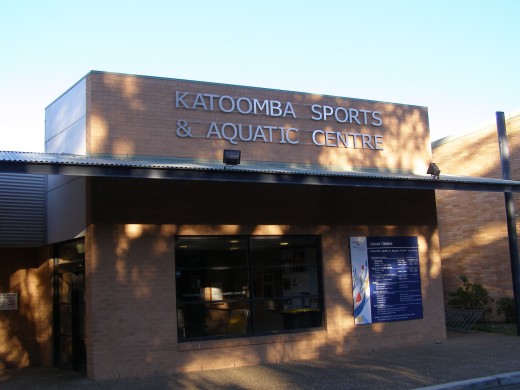 Katoomba Sports & Aquatic Centre
Blue Mountains, New South Wales, Australia Katoomba Sports & Aquatic Centre
Blue Mountains, New South Wales, Australia
.
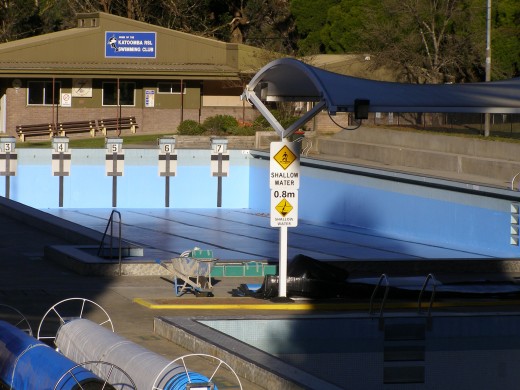 The Outdoor Pool of the Aquatic Centre…drained every winter
(Photo by Editor 20110516, free in public domain) The Outdoor Pool of the Aquatic Centre…drained every winter
(Photo by Editor 20110516, free in public domain)
.
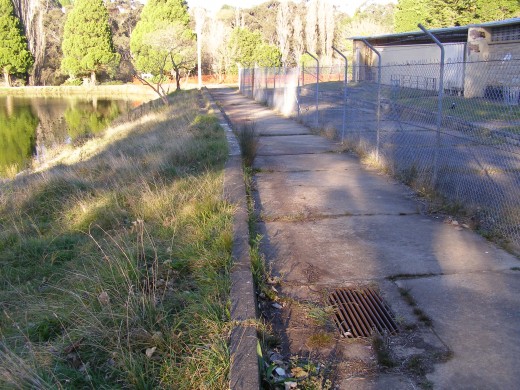 The Aquatic Centre was constructed conveniently adjacent to the Catalina Dam The Aquatic Centre was constructed conveniently adjacent to the Catalina Dam
.
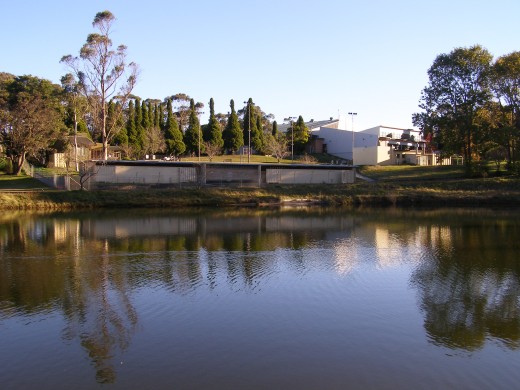 Catalina Dam, which in the late 1940s was glorified as a ‘lake’ by developer Horace Gates
Catalina Dam, which in the late 1940s was glorified as a ‘lake’ by developer Horace Gates
(designed with a flotation levelling system interconnected to adjacent Katoomba Falls Creek)
.
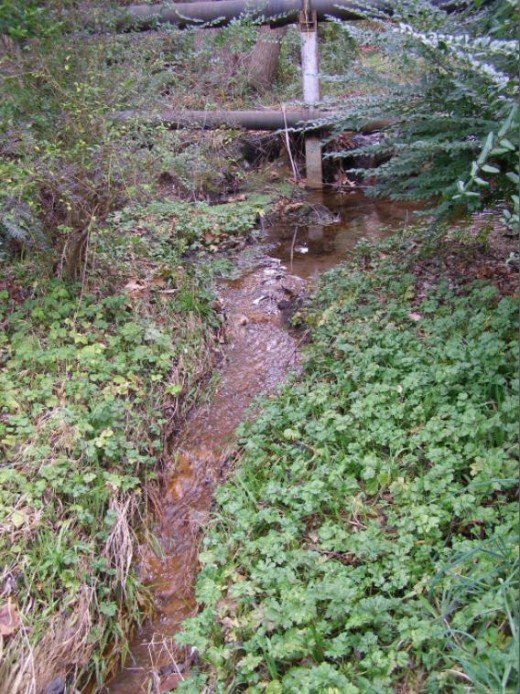 Upper Kedumba Creek downstream of Catalina Dam Upper Kedumba Creek downstream of Catalina Dam
.
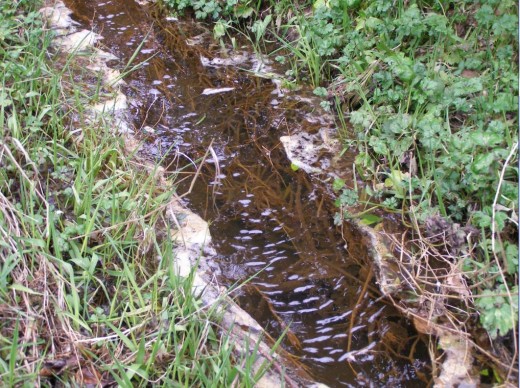 Upper Kedumba Creek downstream of Catalina Dam – close up Upper Kedumba Creek downstream of Catalina Dam – close up
.
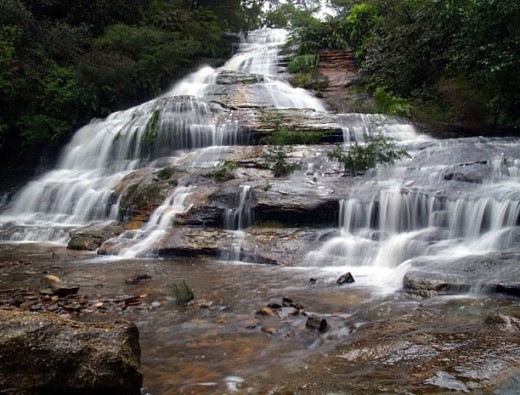 Katoomba Falls Creek naturally flows over Katoomba Falls Katoomba Falls Creek naturally flows over Katoomba Falls
.
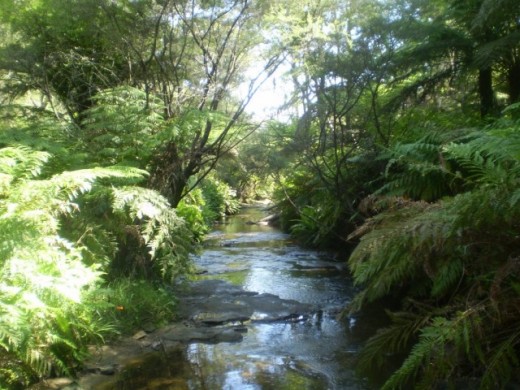 Katoomba Falls flows down the Blue Mountains escarpment into the Kedumba River Katoomba Falls flows down the Blue Mountains escarpment into the Kedumba River
.
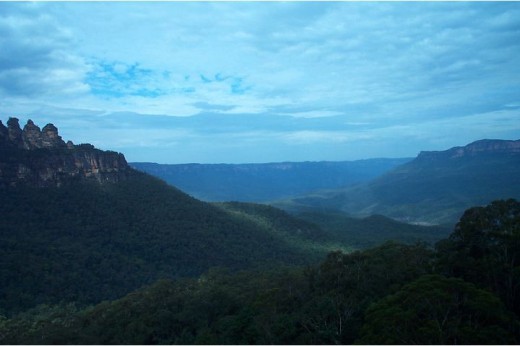 The Kedumba River flows through the Greater Blue Mountains World Heritage Area. The Kedumba River flows through the Greater Blue Mountains World Heritage Area.
Leave a Reply
You must be logged in to post a comment.
October 4th, 2011
The spin from the dying legacy that is Forestry Tasmania, Tasmanian taxpayer subsidised yet still proudly loss making, is palpable.
In 2009, it enticed a travelling UK backpacker, ‘Shannon’, to include its propaganda on her blog ~ silly naive girl.
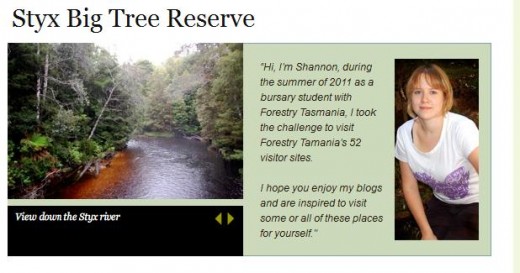
Check the spiel..which Forestry added to its website:
^http://www.forestrytas.com.au/visiting/visitor-sites/central/styx-big-tree-reserve
The Forestry Propaganda continues as follows, but we consider it appropriate to intersperse the spiel with photos of Forestry Truth in the Styx Forests nearby inflicted by Forestry Tasmania and continuing to happen right now in October 2011!
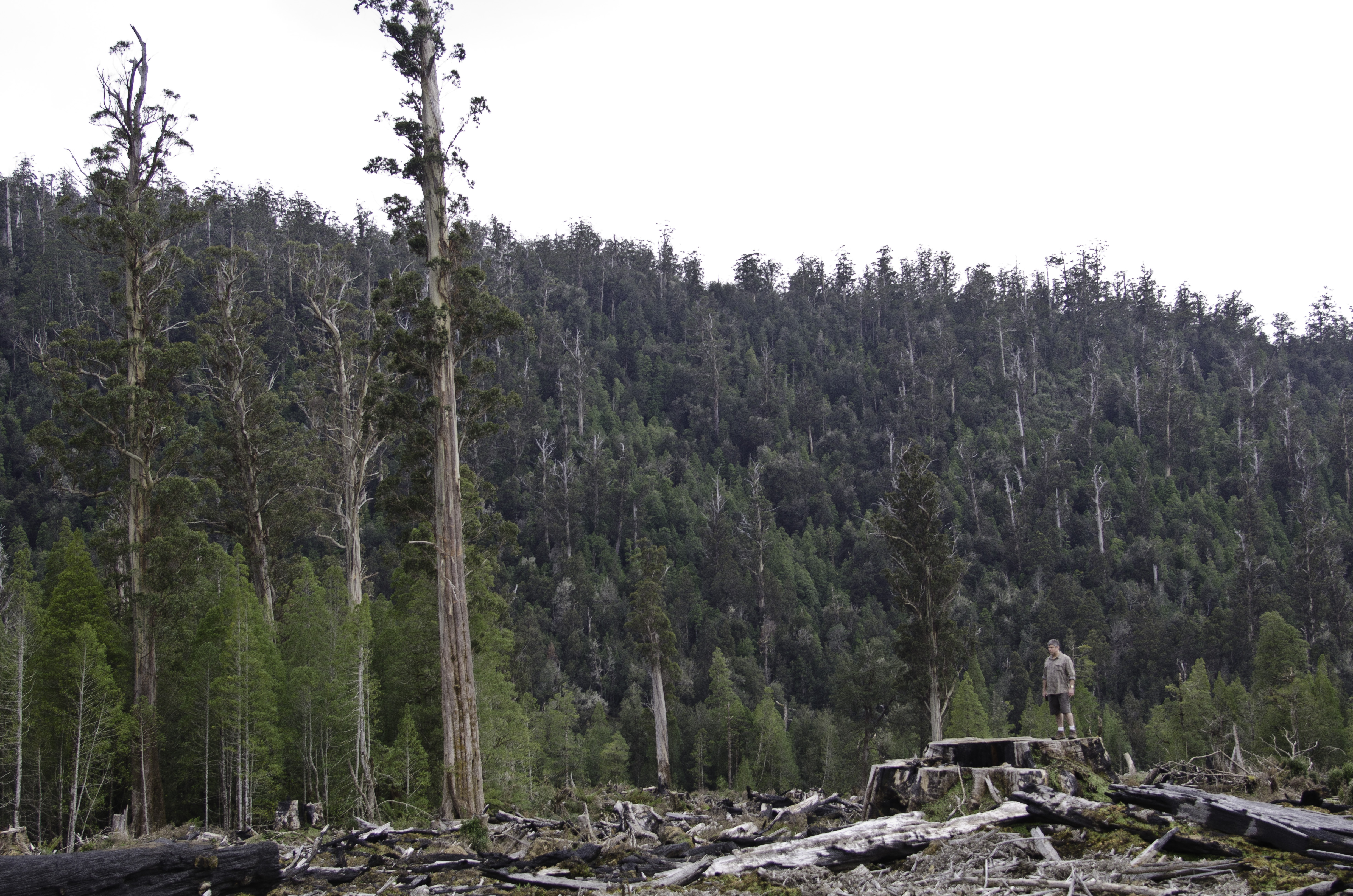 Styx Big Trees decimated around the corner by Forestry Tasmania Styx Big Trees decimated around the corner by Forestry Tasmania
(Photo by Alan Lesheim Photography, 20110928)
.
‘Standing in the pouring rain in the middle of the one of Tasmania’s state forests, is not something I would usually consider fun (the things I do to keep you guys informed). However, on this particular day it wasn’t as bad as it sounds. Where am I…? I hear you ask.
About an hour and 15 minutes north-west of Hobart, is a little town called Maydena, and just a short drive past the town, is the Styx Big Tree Reserve. Well, now you know where I am, let me tell you about the day I spent up there.
I headed up through New Norfolk, along the Lyell Highway, through some charming, little country towns like Glenora and Westerway. Along this road, Maydena is the last point of service, and so I called into Maydena Adventure Hub (Forestry Tasmania’s latest tourism venture) to refuel both the car, and myself. The coffee is lovely, and they have a range of foods, such as toasted sandwiches, salad rolls, and the like. From here, I headed about ten minutes further along the road, to a turn-off which leads you into the heart of the forest, and to the Styx Big Tree Reserve.
The road is gravel; however it had been recently graded so it is suitable to all car types. If you keep your eye out, the signs located along the road will point you in the right direction, and it’s about 15km to the actual reserve. After the initial turn-off there is only one other turn-off and then you basically just following the one road the rest of the way. You can tell you are getting closer if you notice the trees are getting bigger.

(Photo of Styx Forest by Alan Lesheim Photography – click photo to enlarge)
.
The reserve is equipped with toilets, disabled access and a car park. It also has some lovely picnic facilities throughout the forest. Due to my unorganised nature, and the fact that the decision to come up here was very spontaneous, I was not well equipped to deal with the wet weather, or the forest. Luckily, someone in the office leant me their waterproof jacket, and with my jeans tucked into my socks to keep away the leeches (paranoid I know), I told myself to toughen up and get out there!
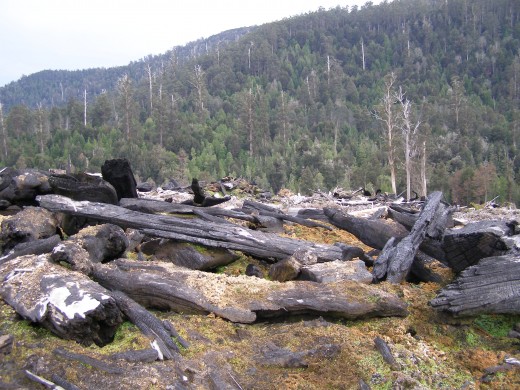
Styx Big Trees incinerated in a irreversible holocaust fire by Forestry Tasmania…”a lack of regular wildfires”…we’ll fix that!
(Photo by Editor 20110928, free in public domain)
.
The Big Tree Reserve has a boardwalk, which takes you on an informative tour of the giants that call this forest home. It turns out that the trees here can grow so big due to a combination of factors including, high rainfall (1000-1500mm per year), high soil nutrient content, and a lack of regular wildfires in this particular area. The trees in this area are over 85m tall, and are swamp gums.
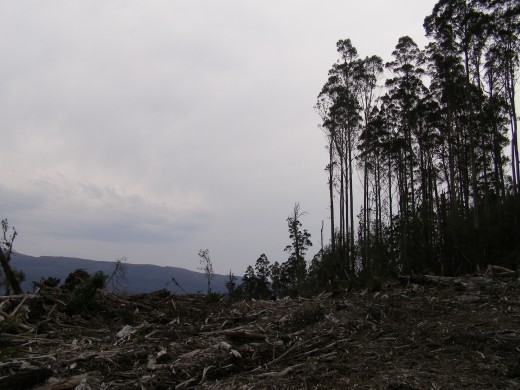 The Styx – what is and what was
(Photo by Editor 20110928, free in public domain) The Styx – what is and what was
(Photo by Editor 20110928, free in public domain)
.
There is so much to learn here, and I won’t tell you anymore, you will just have to come up and experience it yourself! Or, if you like, Maydena Adventure Hub can set you up a guided tour of the Styx Forest, or other areas in the region. The staff in there are very approachable and will be happy to help you out with anything you need to know.
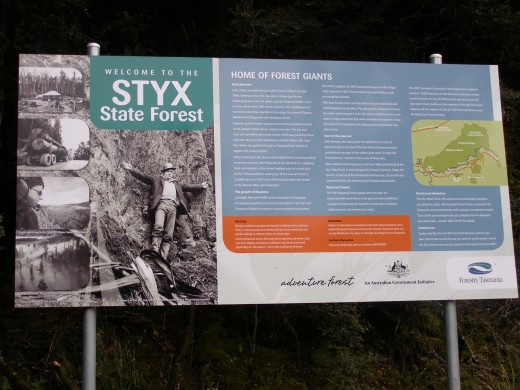
Forestry Tasmania’s infamous tourist ‘Welcome’ sign…welcome to our ‘Styx Holocaust’
(Photo by Editor 20110928, free in public domain)
Rain or no rain, it was a lovely experience. Heading back from the reserve you can either turn right and continue further west to Lake Pedder and Strathgordon, or turn left and explore the rest of what Maydena has to offer. As I left it so late to leave from Hobart that morning, and the wet weather, I thought it would be best just to head back home. However, don’t worry, I will be back shortly and then I will let you know what the rest of the South-West wilderness has to offer.
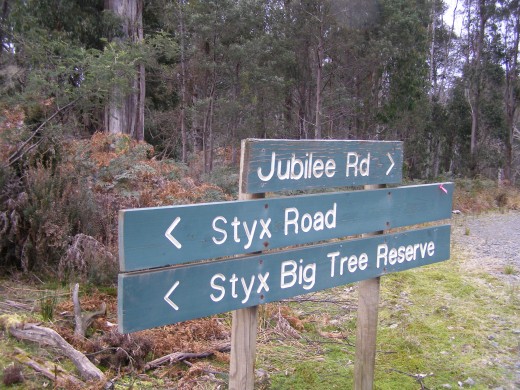
Gullible tourists directed left, while Big Tree ecocide lies in a battle field right nearby.
(Photo by Editor 20110928, free in public domain)
.
Until next time, get out there and explore some of these wonderful sites for yourself. Oh and by the way, someone was just trying to scare me and I didn’t even come across any leeches!’
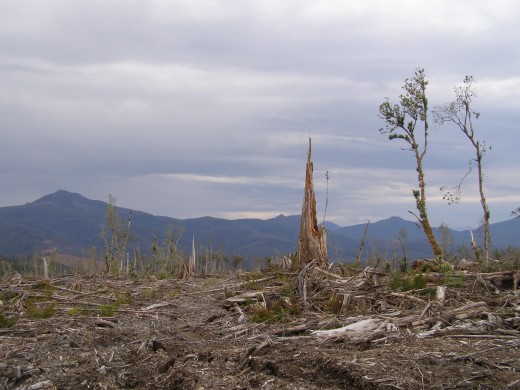 Styx Forest after Forestry Tasmania has been through
(Photo by Editor 20110928, free in public domain) Styx Forest after Forestry Tasmania has been through
(Photo by Editor 20110928, free in public domain)
.
GPS Coordinates :
LAT : 42°48’54.79″S
LON : 146°39’51.46″E
Leave a Reply
You must be logged in to post a comment.
October 2nd, 2011
Just back from a visit to Tasmania’s majestic world heritage Styx Valley, the editor is shocked at the indiscriminate forest ecocide by Forestry Tasmania ~ a Martin Bryant on the loose slaughtering Tasmania’s irreplaceable ancient forest heritage.
 Tasmania’s ancient Styx Forest ~ ancient Myrtles, Celery Top Pines, Blackwoods, Regnans, Sassafras and the wildlife habitat they support…being irreversibly clear-felled and incinerated hectare by hectare by Lara Giddings’ ‘Forestry Tasmania’
[Photo taken on 28th September 2011 by Alan Lesheim Photography]
(click photo to enlarge, then click to enlarge again) Tasmania’s ancient Styx Forest ~ ancient Myrtles, Celery Top Pines, Blackwoods, Regnans, Sassafras and the wildlife habitat they support…being irreversibly clear-felled and incinerated hectare by hectare by Lara Giddings’ ‘Forestry Tasmania’
[Photo taken on 28th September 2011 by Alan Lesheim Photography]
(click photo to enlarge, then click to enlarge again)
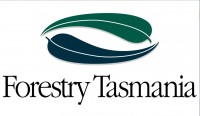 . .
Forestry Tasmania ~ the mind of a ‘forestpath’:
 Martin Bryant ~ the 1996 mass murderer of Tasmania
[Read More]
Martin Bryant ~ the 1996 mass murderer of Tasmania
[Read More]
Like this mentally disturbed misfit, who as a child cut down trees on a neighbour’s property and received an air rifle for his 14th birthday; Forestry Tasmania, has been reared by successive Tasmanian governments creating a subsidised cushion around it that throughout its existence has protected it from reality ~ economic reality, social reality , ecological reality.
Tasmanian Government artificial cushions have acted as constraints that impeded or at least diffused, and gave an outlet for, its most obsessive tendencies ~ clearfell and bush arson. ‘Left to its own mounting frustrations, angers, resentment of rejection and social misunderstanding’. Forestry Tasmania’s current clear-felling rampage ranks among the deadliest for Tasmanian old growth forests in the 21st Century.
.
[Adapted from the Sydney Morning Herald article ‘A dangerous mind: what turned Martin Bryant into a mass murderer?’, by Robert Wainwright and Paola Totaro, 20090427, ^http://www.smh.com.au/national/a-dangerous-mind-what-turned-martin-bryant-into-a-mass-murderer-20090427-ajk4.html]
.
Forestry Tool of the Trade:
 A Doosan Harvester
– a Japanese company, supplying equipment to more efficiently destroy Tasmanian old growth for woodchips back to Japan, or more so China nowadays.
Forestry is stihl about jobs? ~ pull the other one. A Doosan Harvester
– a Japanese company, supplying equipment to more efficiently destroy Tasmanian old growth for woodchips back to Japan, or more so China nowadays.
Forestry is stihl about jobs? ~ pull the other one.
 ‘The Doosan Credo focuses on our responsibilities to people, business and society.
We are confident that by fostering talented people, honesty, transparent business management, and ceaseless innovation, that we will become a “Proud Global Doosan.”
.
[Source: ^http://www.doosan.com/en/about/the_doosan_way.page?]
‘The Doosan Credo focuses on our responsibilities to people, business and society.
We are confident that by fostering talented people, honesty, transparent business management, and ceaseless innovation, that we will become a “Proud Global Doosan.”
.
[Source: ^http://www.doosan.com/en/about/the_doosan_way.page?]
.
Pull the other one!
.
 The Forester Phallic
~ do foresters stihl give their sons chainsaws on their 14th birthday?
The Forester Phallic
~ do foresters stihl give their sons chainsaws on their 14th birthday?
.
.
Tags: Doosan, forest ecocide, Forest Holocaust, forester phallic, Forestry Tasmania, loggers, Martin Bryant, mind of a forestpath, Stihl woodchipping old growth, Styx Big Tree Reserve, Styx Forest, Styx Valley, Woodchipping Tasmania
Posted in Tasmania (AU), Threats from Deforestation, Threats to Wild Tasmania | No Comments »
Add this post to Del.icio.us - Digg
Leave a Reply
You must be logged in to post a comment.
September 24th, 2011
‘Leave No Trace’.. is an internationally-accepted way of minimising impacts on the places we visit, no matter how we choose to experience them. Applying the principles of Leave No Trace can help ensure the protection of Tasmania’s irreplaceable wilderness and heritage for the future.’
~ Leave No Trace Australia [^http://www.lnt.org.au/programs/7-principles.html]
.
.
‘And it’s whispered that soon if we all call the tune
Then the piper will lead us to reason.
And a new day will dawn for those who stand long
And the forests will echo with laughter’.
.
– Led Zeppelin, Led Zeppelin IV
.
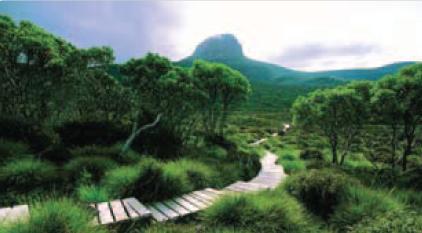 ‘As you visit this special country, please take care to Leave No Trace!’ ‘As you visit this special country, please take care to Leave No Trace!’
(Click this image, then allow the music to play, while you scroll through this article)
.

.
‘Outdoor Ethics’?… do unto Nature as you would have Nature do unto you.
.
Recognise that loud supercilious tourists attract local repulsion, like raw sewage being pumped into a community’s drinking water.
.
.
.
Then there is the Logging World…
.
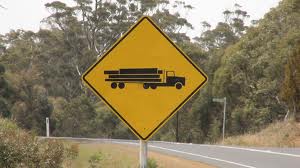 “I am the way and the truth and the life.
No one comes to log except through me.” “I am the way and the truth and the life.
No one comes to log except through me.”
.
A “logger” logs
I am that “logger”
Therefore I log
Therefore I am.
 . .
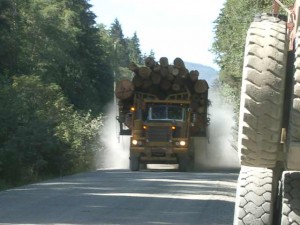 Logging Canada Logging Canada
.
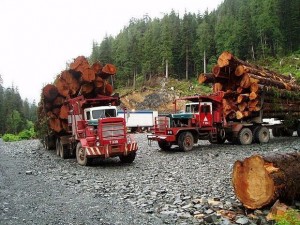 Logging British Columbia Logging British Columbia
.
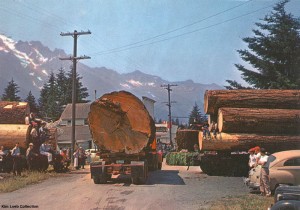 Logging Oregon ~ that’s a ‘single rider’ Logging Oregon ~ that’s a ‘single rider’
.
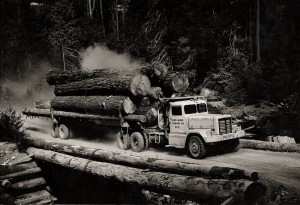 Logging Tasmania like there’s no tomorrow..and they were right Logging Tasmania like there’s no tomorrow..and they were right
.
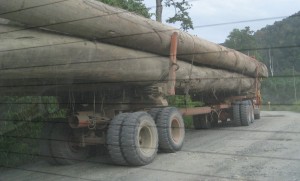 Logging Borneo
~ a rearward perspective Logging Borneo
~ a rearward perspective
(click to enlarge)
.
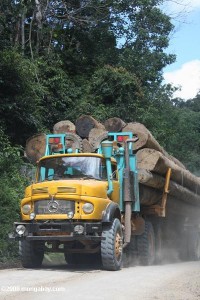 Logging more of Borneo Logging more of Borneo
.
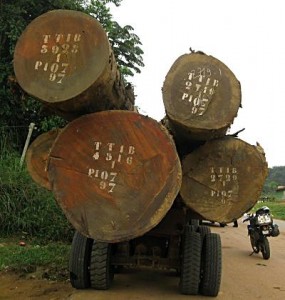 Logging Gabon, west African rainforest Logging Gabon, west African rainforest
.
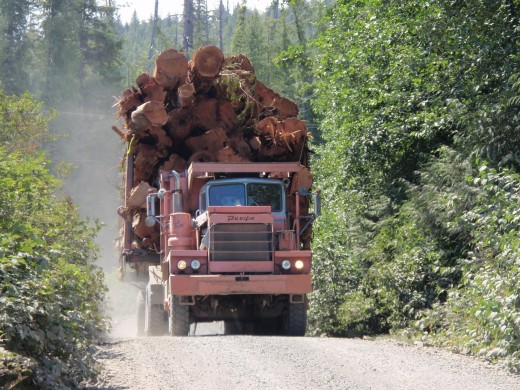 Get out of my bloody way!
It’s logging season and they could change the laws next week! Get out of my bloody way!
It’s logging season and they could change the laws next week!
.
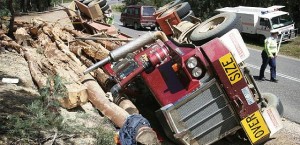 Quality Control in Tasmanian Logging Quality Control in Tasmanian Logging
.
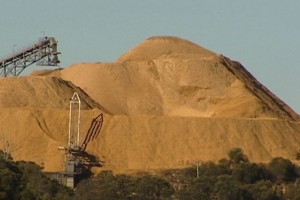 Triabunna’s Forest Death Camp Triabunna’s Forest Death Camp
.
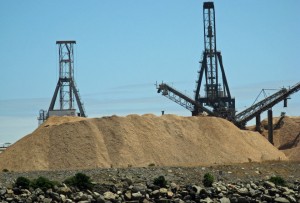 Burnie’s Forest Death Camp Burnie’s Forest Death Camp
.
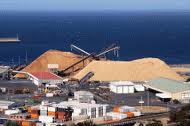 Woodchip Town
~ home of loggers…twenty eight generations at least! Woodchip Town
~ home of loggers…twenty eight generations at least!
.
.
‘Ta Ann’: Forestry Tasmania’s Malaysian Veneer
.
Desperate to find new buyers to justify logging Tasmanian native forests, Forestry Tasmania has sought its Malaysian Solution. The propaganda was that ‘the mills will process regrowth logs only’ and will create local jobs. But after investing tens of millions in two veneer mills, Malaysian logger, ‘Ta Ann’ is now pressuring the government to give them access to Tasmanian native forests to feed the mill monsters. So it was all a veneer of truth.
It all screams of the 1916 ‘Zinc Bargain‘ when the Tasmanian government approved a hydro bulk power contract for the Amalgamated Zinc smelter. By the 1930s, the smelter was swallowing up 3/4 of the Hydro Electric Departments electricity output. Dodgy government deals for big foreign corporates to exploit Tasmania’s native forests. Indeed, Newood mill in Huon built by John Holland the Huon Wood Centre Infrastructure
John Holland has reached practical completion of the stage 2 infrastructure works on the Huon wood centre site required the installation by Transend of a 110kV transmission spur to divert hydro-electrical power from Castle Forbes Bay to power Ta Ann’s Huon mill. .
‘In 2005, Forestry Tasmania was successful in securing the commitment of the Malaysian-based timber company, the Ta Ann Group, to develop two rotary veneer peeling mills in Tasmania at a cost of $65 million. The mills will process regrowth logs only [ed: famous last words] and are to be located ‘in the forest.’
“A rotary veneer mill is an efficient means of adding value to short logs that are not useable for higher-value purposes such as sawmilling,” ~ Bob Gordon (Managing Director of Forestry Tasmania)
In 2007, the first of the mills opened in the Huon district and the second, at Smithton in the North West is currently under construction. When fully operational, the two mills are expected to employ 120 Tasmanians. [ye ol’ jobs lure]
Now many regrowth logs that were previously classified as pulpwood are suitable for the manufacture of rotary veneer for construction grade products. Through Forestry Tasmania’s partnership with Ta Ann, up to 25% of wood that was previously chipped is now ‘peeled’ here in Tasmania for higher value veneer production.’ [Source: ^http://www.forestrytas.com.au/regional-dev]
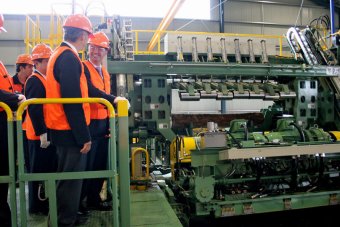 Politicians froth at the prospect of launching anything in front of the media
..here Tasmanian then Premier David Bartlett launching ‘the veneer’ of the Veneer Mill in Smithton in 2008 – ‘plantations only’
. Politicians froth at the prospect of launching anything in front of the media
..here Tasmanian then Premier David Bartlett launching ‘the veneer’ of the Veneer Mill in Smithton in 2008 – ‘plantations only’
.
.
‘The company expects the mill will employ 50 people once it reaches full production. Construction on the $35 million rotary peel mill began in April and last month the company exported its first shipment of veneer to Malaysia.
Today’s symbolic opening was attended by the mill’s Malaysian backers, including the Ta Ann Chairman Datuk Hamed Sapawi, who says Tasmanian eucalypt veneer is particularly well regarded on international markets.
Ta Ann’s first Tasmanian mill in the state’s south began production last year, with the Smithton mill bringing the company’s total investment in Tasmania to $70 million.
Mr Bartlett says the two mills add significant value to timber that would have otherwise been exported as wood chips.’
[Source: ‘Veneer mill officially online’, ABC, 20081128, ^http://www.abc.net.au/news/2008-11-28/veneer-mill-officially-online/222334]
.
 Logging Mogul, Abdul Hamed Sepawi
Malaysian millionnaire boss man and logger pay master – owner of multinational logger ‘Ta Ann’ Logging Mogul, Abdul Hamed Sepawi
Malaysian millionnaire boss man and logger pay master – owner of multinational logger ‘Ta Ann’
.
Sepawi started Ta Ann as a trading firm and now it’s a timber conglomerate with more than 3,000 employees. Ta Ann invests in property development through listed Naim Holdings, which he chairs. Petrol giant Petronas awarded a Ta Ann subsidiary and partner a $780 million deal late last year to build an oil and gas terminal in Kimanis on Borneo.’
But ‘Australian activists are wondering how the Ta Ann Group managed to develop powerful political links in Tasmania. The multi-million-dollar Sarawakian business concern, Ta Ann Group, has managed to secure a grant from the Australian government to invest in a wood veneering factory in Tasmania. Astonished observers and environmentalists, however, are wondering why the Australian government would pay the Sarawak Chief Minister Taib Mahmud-linked company to strip their forest?
Ta Ann is run by Taib’s cousin and well-known proxy, Hamid Sepawi. Sepawi owns a third of the company. According to the Green Party, thus far no satisfactory answer has been provided.
When the project was awarded to Ta Ann, it was with the hope that it would breathe life into a struggling industry.
Ta Ann, when it opened the project, promised that the project would would rely on plantation forests and not extract wood from Tasmania’s remaining high conservation value forests.
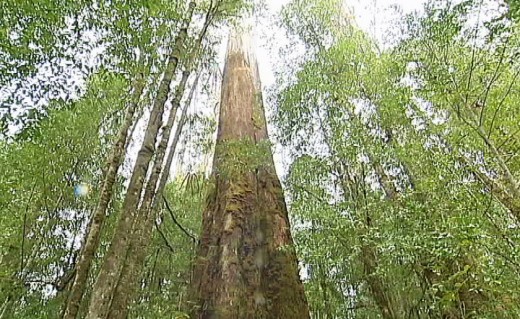 Stihl logged – Tasmanian Native Forests
“Tasmanian eucalypt veneer is particularly well regarded on international markets” ~ Sapawi. Stihl logged – Tasmanian Native Forests
“Tasmanian eucalypt veneer is particularly well regarded on international markets” ~ Sapawi.
.
Tasmania’s primary jungle has been classified as “high conservation value forests”. But recent developments have revealed otherwise. Ta Ann is now pressuring the government to give them access to primary jungle because the quality of plantation wood is not sufficient for their factory and they are demanding hardwood from the jungle.
Environmental group Huon Valley Environment Centre’ spokesman Jenny Weber said the Tasmanian government and Ta Ann were locked in logging the native Tasmanian forests.
“The Tasmanian government and Ta Ann are locking in the logging of native forests to meet a wood supply contract till 2027.
“High conservation value forests are being lost to feed Ta Ann’s mill, when they should be in a moratorium now,” she said.
.
Protests met with contempt
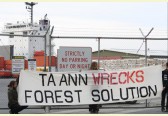 . .
Weber and several activists yesterday boarded a Ta Ann boat laden with wood taken from Tasmania’s primary jungle. They climbed to the top of the boat’s crane tower and chained themselves to it in a bid to draw attention to Ta Ann’s greedy plunder of their own forest.
The protesters are not alone in their anti-logging stance. There has been similar protests and actions like this one in the past, especially in the port areas. These protests have been met with strong-armed tactics and contempt by the authorities.
Earlier this year, the Tasmanian Port Authority announced a 50-metre exclusion zone around all vessels exporting wood chip and veneer. The move is seen as an attempt to prevent protests from holding up Ta Ann’s exports.
There is an overwhelming view among Australians that all logging of primary jungles should be stopped.
Much curiosity has risen as to how this Taib-linked company managed to develop such powerful political links in Tasmania, which is considered to be Australia’s remotest region.
The latest campaign in Tasmania against Ta Ann is a sign of the developing international awareness of Taib and how his greedy pacts with timber tycoons has stripped the Sarawak forest bare.
He and his cronies have spread their tentacles abroad, engaging in plunder across the world’s few remaining areas of virgin jungle.
Tasmania is developing a strong movement to prevent that from happening in its region.
Tasmanian environmentalists now join a legion of other activists across the globe who are against the logging of the world’s remaining forests and the injustices meted out to the indigenous communities in Sarawak and elsewhere.
.
[Source: ‘Why’s Australia ‘paying’ Taib-linked group?‘, 20110719, by Clare Rewcastle Brown, founder/editor of Sarawak Report,^http://hornbillunleashed.wordpress.com/2011/07/19/20969/]
.
.
.
Forestry Tasmania’s Chinese Solution
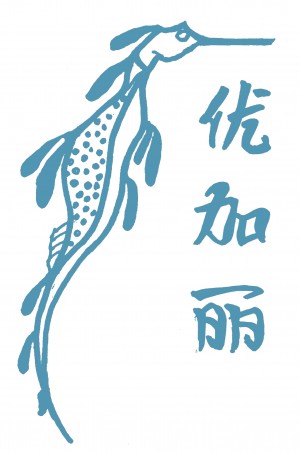 Tasmania’s Weedy Sea Dragon
… appropriated for Chinese gain over Tasmania and Tasmanians ~ wake up! Tasmania’s Weedy Sea Dragon
… appropriated for Chinese gain over Tasmania and Tasmanians ~ wake up!
.
‘Forestry Tasmania is always seeking new markets for the Tasmanian forest industry.For example, it has established a new brand in China to promote ‘sustainably harvested‘ Tasmanian peeler logs. Eu Jia Li, (translation: strong and beautiful) is already well respected and it is hoped that it will become a vehicle for a robust trading relationship between Tasmania and China. The Tasmanian weedy sea dragon has been chosen as the brand logo because, like eucalypts, it is indigenous to Tasmania and in Chinese culture, the dragon represents strength and power…for China!
How appropriate a logo! Like Tasmania’s high conservation value native forests, Tasmania’s seadragons have become scarce and are under continual threat from poaching and pollution. The only reason the sea dragon is respected in Chinese culture is because it is killed for backward and superstitious Traditional Chinese Medicine. Traditional Chinese Medicine prescribes seahorses are prescribed from ailments such as asthma, arteosclerosis, dizziness, joint pain, impotence and incontinence. Dried sea horses are consumed for virility.
What is wrong with Viagra? Seadragons in Australia are officially protected by the Federal Government of Australia, but try telling Forestry Tasmania that!
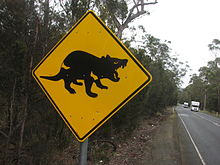 Here’s a logo to send back to the Chinese loggers! Here’s a logo to send back to the Chinese loggers!
.
.
Forestry Tasmania’s ‘Biomass’ Solution
.
Here’s the greenwash spin for biomass by Forestry Tasmania:
‘As governments around the world grapple with global warming, attention is turning to an age old solution – biomass.
Biomass – essentially organic material such as wood from forests or waste material like cattle dung – is one of the oldest sources of energy and is now undergoing a revival as countries look for alternatives to fossil fuels.
The world’s leading countries in renewable energy production, Denmark, Sweden, Finland, the United States and others in Europe are using forest waste in particular to generate electricity.
Forestry Tasmania has been planning for a biomass plant in the south of the state for at least five years. When it developed the investment ready site at Southwood in the Huon Valley, Forestry Tasmania set aside an area for a biomass plant, to generate renewable energy from forestry debris that would otherwise be burnt.
Using our international contacts, we are seeking investors for this exciting project. If successful, we will not only produce more electricity for the state, but reduce greenhouse gases and the amount of smoke generated by forest fires.’
.
[Source: Press Release: ‘Biomass – a new form of renewable energy’, Forestry Tasmania, ^http://www.forestrytas.com.au/regional-dev, retrieved 20110924]
.
But the historical veneer is that once the furnaces are built, like the veneer mills, the multinationals will pressure the Tasmanian government for more fuel and native forests will become fodder for yet another Forestry scheme. Forestry Tasmania knows this and will argue its age old justification of jobs, job, jobs.
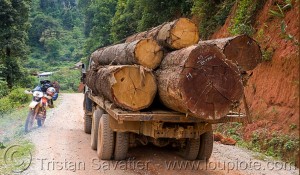 Like all great loggers, I have seen more than I remember, and remember more than I have seen. Like all great loggers, I have seen more than I remember, and remember more than I have seen.
.
.
Further Reading:
.
[1] Seahorses and Chinese Backward Medicine
.
‘In China, seahorses are prescribed from ailments such as asthma, arteosclerosis, dizziness, joint pain, impotence and incontinence. The fact that dried sea horses are consumed for virility is ironic because sea horse are a species in which the males get pregnant.
Seahorse soup “North is ginseng and south is seahorse” is a Chinese adage from the Divine Peasant’s Herbal Compendium. But Chinese have not been the only ones who consumed seahorses as a medicine. The Roman historian Pliny the Elder reported that “ashes of seahorse…mixed with soda and pig’s large” cured baldness.
In Hong Kong, “inferior” seahorses sell for about $100 a pound, Higher quality ones go for around $400 a pound. The seahorses are usually ground and mixed with herbs and other ingredients a made into a tea. An estimated 2 million seahorse were consumed n China in 1992, a tenfold increase from the previous year. Three million wee consumed in Taiwan the same year.
“North in ginseng and south is seahorse” is a Chinese adage from the Divine Pearls Herbal Compendium . In China medicine seahorses are usually ground and mixed with herbs and other ingredients a made into a tea. They are prescribed from ailments such as asthma, atherosclerosis, dizziness, joint pain, impotence and incontinence. The Chinese are not the only people who have used seahorses for medicine. The A.D. first century Roman historian Pliny the Elder reported that “ashes of seahorse…mixed with soda and pig’s large” cured baldness.
Seahorse sales took off in China when the country began opening up in the 1990s. An estimated 2 million seahorse were consumed in China in 1992, a tenfold increase from the previous decade. Three million were consumed in Taiwan the same year. In Hong Kong at that time “inferior” seahorses sold for about $100 a pound. Higher quality ones went for around $400 a pound.
About 25 million of seahorses were harvested every year in the 1990s. About 95 percent of them were sold in Asia for medicines and aphrodisiacs. They are also collected alive for salt water aquarium and sold dried at souvenir shops. In the 1990s their price went up to $800 a pound.
Wild seahorses are caught by hand, with dip nets or as bycatch from shrimp trawlers. Seahorse hunter generally go after their prey at low tide at night, A good hunter can catch 60 a night. Most are dried and sold to middlemen for the Chinese medicine for about 60 cents a piece.
Seahorses are difficult to raise in captivity. They are picky eaters susceptible to disease and die easily. Thus they are difficult to raise commercially and have to be harvested in the wild. Their monogamy doesn’t serve them well. If one loses a partner he or she doesn’t chose another. The company Seahorse Ireland raises seahorses from birth and has had success getting them to mates and breed in captivity. The company sells seahorses for for $2.50 a piece over the Internet.
Seahorses have disappeared from sea grass beds and mangroves from Florida to Ecuador, and on coral reefs from India to Vietnam. Reefs in the Philippines that were once teeming with seahorses are now almost void of them. So many seahorses have been caught that many species are regarded threatened or endangered. Seahorse habitats—coral reefs, grass beds and mangroves—are increasingly under stress from dredges, overfishing, coral dynamiting and pollution.
In 2003 seahorses were declared an endangered species by The United Nations Convention on International Trade on Endangered Species (CITES). An international ban on seahorse trade was imposed unless the captive-bred or used for scientific purposes. In no-fishing zones seahorses have rebounded.’
[Source: ^http://factsanddetails.com/china.php?itemid=331&catid=12]
.
.
[2] ‘Weedy Sea Dragon Protection – 12 April 2011’
.
‘I want to talk this evening about an interesting marine species known as the weedy sea dragon. It is a charismatic mesofauna that members might be interested to know about! Importantly, it is endemic only to southern Australian waters. It is protected everywhere else in Australia from being taken. When I was involved in marine and coastal conservation, particularly with the establishment of the Cottesloe marine protected area, it came to my attention because weedy sea dragons have been seen in that area. One of the reasons for creating that fish habitat–protected area was to encourage that species, amongst others, to thrive in the area and to protect them from recreational activities. They are greatly admired by scuba and snorkel divers because they are very interesting animals to watch. The fact that they are protected elsewhere in Australia actually means that they are inadvertently more likely to be taken here in Western Australia, making them even more vulnerable. The Australian Environment Protection and Biodiversity Conservation Act 1999 lists weedy sea dragons as a nationally threatened species. The International Union for Conservation of Nature lists weedy sea dragons as near-threatened species because of human impacts on the inshore habitat. They are vulnerable because of deteriorating conditions in the inshore habitat, but they are also vulnerable in other ways.
Australia is a signatory to the Convention on International Trade in Endangered Species of Wild Fauna and Flora. The aim of CITES is to ensure that international trade in wild animals and plants does not threaten their survival. In 2002, all seahorse species—the weedy sea dragon is part of the same family—were CITES listed because of concerns over unsustainable exploitation. Members may be aware that they are highly sought after in the Chinese medicine market. There is international concern about how vulnerable this species is. Western Australia, however, still sells them and allows recreational fishers to take threatened weedy sea dragons. Unpublished genetic studies have been carried out on weedy sea dragons, and show that weedy sea dragons west of the Great Australian Bight are actually a separate species, warranting a new name and, in fact, making them even more special. The ones on our side of the southern part of Australia are genetically separate.
The number of weedy sea dragons collected by marine aquarium fishers has decreased in recent years but we are concerned that this may indicate that the population has substantially decreased. We cannot find out from the Department of Fisheries how many there are. It is interesting that collectors want to collect pregnant males for the aquarium industry. Pregnant males are especially sought after under the marine aquarium fishery licences because it is extremely rare for weedy sea dragons to breed in captivity. The fry born from captured pregnant males will sometimes survive in specialist aquaria.
There is great demand for weedies for aquariums, particularly from Sydney and several overseas countries. It is of concern that there are no population figures available for weedy sea dragons and no monitoring is done. Currently, WA has a recreational bag limit of 30 per day. That is of great concern. Weedy sea dragons are sparsely distributed and have very small territories. In fact, they are very territorial. Despite their cryptic nature, some experienced hunters can still find them. A lot of dive operators will not show people where weedy sea dragons are because they are worried that they will come back later and take them for the aquarium trade.
Interestingly, weedy sea dragons are monogamous. If a pregnant male is captured, the female may never breed again. Also, they are very poor swimmers, have specific dietary needs and have a low fecundity. It is a wonder they survive at all. Once these weedy sea dragons are protected, dive and snorkel businesses can develop around them, especially in country WA. As I say, dive operators are presently nervous about showing visitors any animals they find as there have been instances of people returning and collecting them after a guided dive. Owners of the Seahorse Sanctuary in Kalbarri, which members may be aware of, say there is a black market in syngnathids, which is the generic name for this family of animals. This is detrimental to their business. They breed seahorses, not weedy sea dragons. The breeding of seahorses can be done in captivity, but weedy sea dragons do not breed in captivity. Millions of seahorses are traded each year for the Chinese traditional medicine trade. As seahorses are disappearing worldwide because of over-collection, conservationists fear that sea dragons will be targeted for this very lucrative trade. This reason was cited by the South Australian fisheries minister, Rory McEwen, when he announced protected species status for seahorses, pipe fish and weedy sea dragons in South Australia. That was back in February 2006.
Most people are no longer comfortable with creatures being in cages and bowls, especially when they die. This is the case with weedies in the domestic aquaria trade. Weedy sea dragons have become an iconic species, certainly in terms of the conservation sector and dive operators. My concern is that we do not know the population numbers of weedy sea dragons in Western Australia. We have received some conflicting figures from the Department of Fisheries on the estimated population. Weedy sea dragons are vulnerable to changes in their nearshore environment. They are also vulnerable in Western Australia because the taking of them is banned elsewhere in Australia. Therefore, those who have licences to take them in WA have an incentive to do so. What I am saying to the Minister for Fisheries—I am sure he will take note of this—is that there is a very strong case for weedy sea dragons to have protected status in Western Australia as well. I argue that the number of weedy sea dragons taken by the aquarium trade is so low that it is not a substantial economic trade. If we do not know how many of these animals are left, but they have been identified as being under threat, now is the time to prohibit the taking of them. It is much easier to monitor and police a protection order of that nature than to have some system of trying to control and monitor the number taken. That is a very good argument. People value seeing these animals, particularly in the marine protected areas in the metropolitan area, because they are quite extraordinary. It is really important that the minister says that there should be no more taking of these animals. That would be a great bonus for this iconic species that is dearly loved by not just conservationists but also people who enjoy recreational diving.’
.
[Source: ‘Weedy Sea Dragon Protection‘, Giz Watson MLC (Western Australia), 20110412, ^http://www.giz-watson.net/2011/http:/www.giz-watson.net/2011/archives/2011/04/19/weedy-sea-dragon-protection-12-april-2011/]
.
.
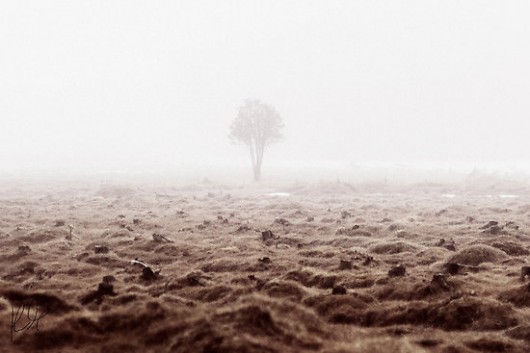 Last Tree Standing Last Tree Standing
‘Exploitation of the foreground.
Identifying the wasteland.
The closest friend.
Promises to the end.
Everyone else is gone.
All possibilities, equal to none?
On one leg, standing.
An insight was landing.’
~ Henrik Malmborg.
[Source: ^http://www.redbubble.com/people/malmborgphoto/art/6969815-last-tree-standing]
.
Tags: a single rider, Amalgamated Zinc, forest death camp, forest rape, Forestry Tasmania, Huon Wood Centre, I am the way and the truth and the life. No one comes to log except through me, I log therefore I am, Last Tree Standing, Leave No Trace, logging Borneo, logging Canada, logging Gabon, logging Oregon, logging Tasmania, logging trucks, logging veneer, Newood, outdoor ethics, Smithton Veneer Mill, southwoodresources, Stairway to Heaven, Ta Ann Group, Tasmanian logging, Triabunna, veneer of truth, Woodchipping Tasmania, Zinc Bargain 1916
Posted in Tasmania (AU), Threats from Deforestation, Threats to Wild Tasmania | No Comments »
Add this post to Del.icio.us - Digg
Leave a Reply
You must be logged in to post a comment.
September 22nd, 2011
Like a skin-burned landscape flaking, Tasmania’s disappearing wild forests are revealed on Google Maps. The 19th Century colonial timber-getting landscape around Hamilton in the lighter treeless region on the right of the image. In 2011 the colonial mentality pervades in burnt clearfelled coupes on the left side of the satellite image below. Tasmania’s tall Eucalypt forests and the ecosystems they support face a denuded Hamilton vision or at best a sterile silviculture.
Fourth generation Tasmanian loggers knowing no better, mindlessly scarring their rich timbered homeland for a pittance to feed the profits of multinationals, and knowingly deny their children the endless Tasmanian forests they knew as children. It is Thylacene Bigotry repeated down generations.
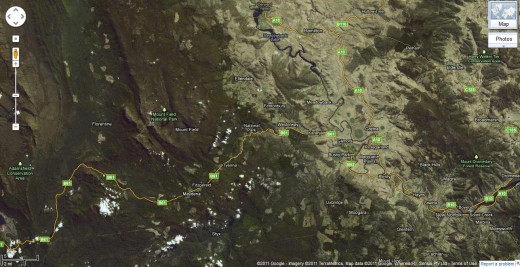 Satellite Map of Tasmania showing vast areas of clearfelled native forest scars.
(Click photo to enlarge)
(Simply go to Google and type in Tasmania Map in Google and zoom in)
.
Satellite Map of Tasmania showing vast areas of clearfelled native forest scars.
(Click photo to enlarge)
(Simply go to Google and type in Tasmania Map in Google and zoom in)
.
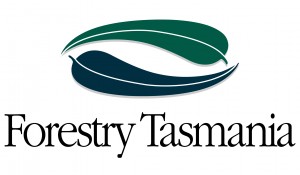
The culprit, Forestry Tasmania (FT), has made it a cliche to hide its destruction from public roads, but can no longer hide from Google Maps.
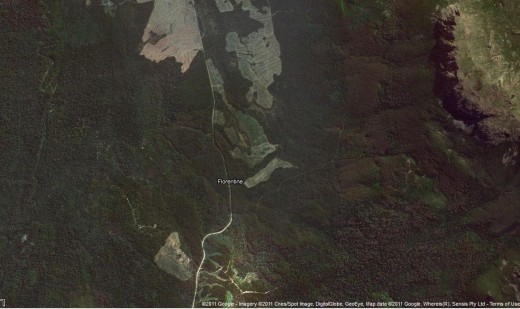 Zooming in on the massive scaring of the Florentine Forest.
(click to enlarge image) Zooming in on the massive scaring of the Florentine Forest.
(click to enlarge image)
(Google Maps)
.
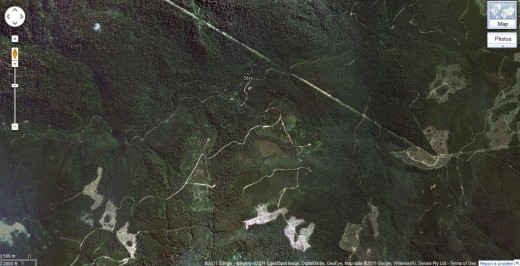 Zooming in on the massive scaring of the Styx Valley Forest.
(Google Maps) Zooming in on the massive scaring of the Styx Valley Forest.
(Google Maps)
.
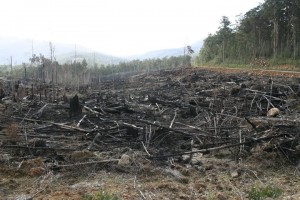
‘This charred scene of forest devastation here in Southern Tasmania stands as a stark symbol of the industrial scale logging operations that are ripping apart Australia’s native forests every single day. Harvey Norman needs to stand up, show some genuine environmental leadership and stop selling native forest products to the Australian people’ said Ms Majewski. [^http://www.thelaststand.org.au/]
[Source: ‘Massive banner unfurled in Tasmania drawing attention to Harvey Norman forest destruction’, by anonymous 20010811, ^http://indymedia.org.au/2011/08/15/massive-banner-unfurled-in-tasmania-drawing-attention-to-harvey-norman-forest-destruction. Watch Video]
.
.
So where does Harvey Norman’s EKO Wood ‘Jatoba’ come from?…
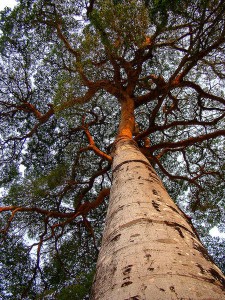 Jatobá (Hymenaea courbaril)
A tall rainforest hardwood tree common to the Caribbean, Central, and South America.
It is killed for hardwood furniture and flooring.
Go to hell Harvey Norman, go! Jatobá (Hymenaea courbaril)
A tall rainforest hardwood tree common to the Caribbean, Central, and South America.
It is killed for hardwood furniture and flooring.
Go to hell Harvey Norman, go!
.
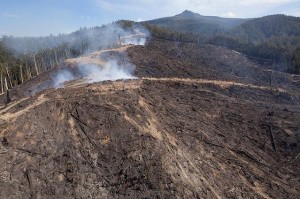
The bastards are clear-felling Tasmania’s majestic Styx Valley in 2011!
Do they hate Tasmania that much?
(Source: ^http://www.thelaststand.org.au/)
(Photo: R. Blakers)
.
..
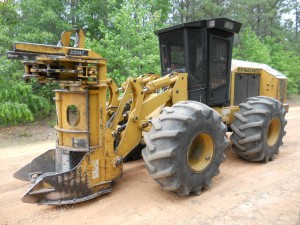 Tools of the trade for Forestry Tasmania – Industrial Forestry Bondage – a CAT 553 fellerbuncher- Tools of the trade for Forestry Tasmania – Industrial Forestry Bondage – a CAT 553 fellerbuncher-
But then machines are more efficient than people, and unlike selective logging, with contract woodchipping you don’t have to think ~ ‘its all good’.
Shit Money. Shit Future. Pulping Tasmania’s Heritage so that Jap’s can sell their paper back to us mugs.
(click to enlarge photo)
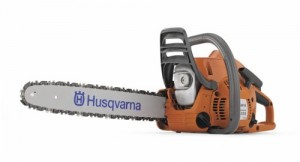
Husqvarna – ‘taming the wild’ and selling their last chainsaws to a dying culture
– like the Japs killing dolphins at Taijin.
.
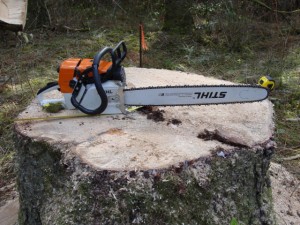 Stihl Chainsawing Tasmania’s Western Front Stihl Chainsawing Tasmania’s Western Front
.
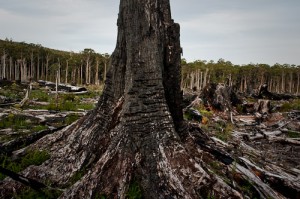 A FT holocaust survivor
. A FT holocaust survivor
.
(‘Holocaust’ comes from the Greek, holos meaning ‘completely’ and kaustos ‘burnt’
~ to burn away, leaving no trace of what was previously there. (A. Krien, 2010, p.122)
.
.
.
.
Tags: CAT 553 Fellerbuncher, EKO Wood, Forestry Tasmania, FT, Google Maps Tasmania Map, Harvey Norman, Husqvarna, Hymenaea courbaril, Industrial Forestry Bondage, Jatoba, Rob Blakers Photography, Stihl, Styx Valley, taming the wild, Tasmania's tall Eucalypt forests, Tasmania's Western Front, The Last Stand, Thylacene Bigotry, Upper Florentine Forest, woodchipping - it's all good, Woodchipping Tasmania
Posted in Tasmania (AU), Threats from Deforestation, Threats to Wild Tasmania | No Comments »
Add this post to Del.icio.us - Digg
Leave a Reply
You must be logged in to post a comment.
September 17th, 2011
 Play music, then click back to this site, zoom in to make the photos larger and scroll through this article and appreciate the magic of what was Lake Pedder. Play music, then click back to this site, zoom in to make the photos larger and scroll through this article and appreciate the magic of what was Lake Pedder.
.
The pristine glacial lake it once was.
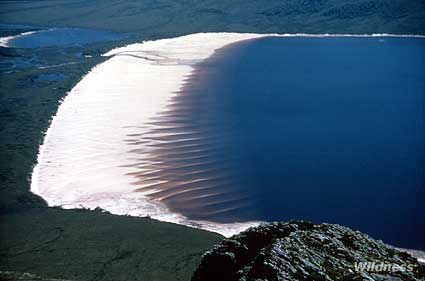
The jewel of Tasmania’s primeval sacred ecology.
.
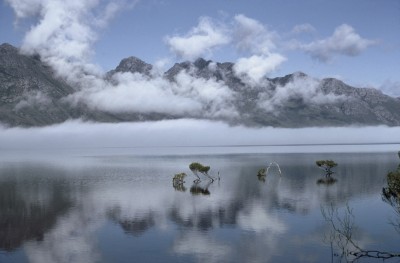 Lake Pedder
(Photo by Olegas Truchanas (1923-1972) Lake Pedder
(Photo by Olegas Truchanas (1923-1972)
.
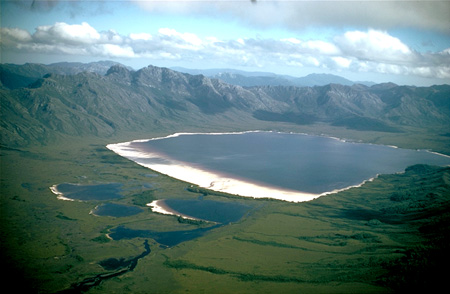 This photo currently appropriated on the website of Tasmanian Resource Planning and Development Commission,
which as the ‘Hydro-Electric Commission’ flooded the lake in 1972 and which oddly uses the word ‘justice’ in its web address.
^http://soer.justice.tas.gov.au/2003/image/544/index.php This photo currently appropriated on the website of Tasmanian Resource Planning and Development Commission,
which as the ‘Hydro-Electric Commission’ flooded the lake in 1972 and which oddly uses the word ‘justice’ in its web address.
^http://soer.justice.tas.gov.au/2003/image/544/index.php
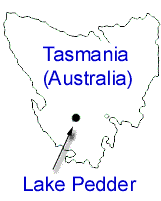
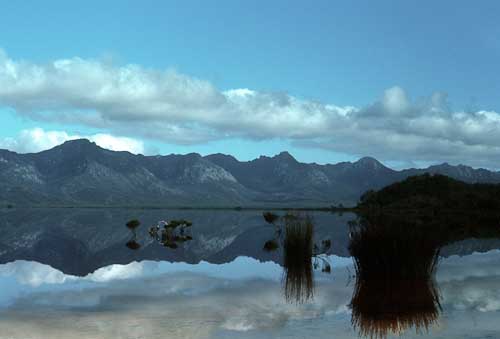
New Book Release:
.
‘Pedder Dreaming: Olegas Truchanas and a lost Tasmanian Wilderness’
by Natasha Cica, September 2011 | ISBN 978 0 7022 3672 3 | RRP:$59.95, | 230mm x 203 mm | Illustrated | 256pp (full colour) | Published by UQP | [Read More]
.
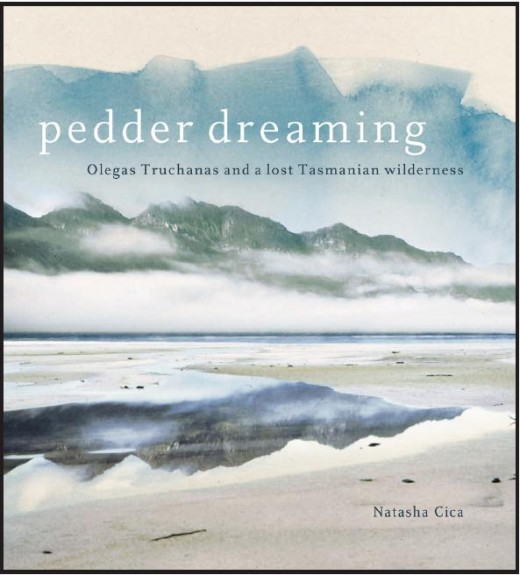
‘In 1972 Lake Pedder in Tasmania’s untamed south-west was flooded to build a dam.
Wilderness photographer Olegas Truchanas, who had spent years campaigning passionately to save the magnificent fresh water lake, had finally lost.
The campaign, the first of its kind in Australia, paved the way for later conservation successes, and turned Truchanas into a Tasmanian legend. Pedder Dreaming quietly evokes the man, the time and the place.
Truchanas, a Lithuanian émigré, is a stalwart adventurer, loving family man, activist, thinker, survivor and artist. Australia on the cusp of environmental awareness is the time, and Lake Pedder and the south-west of Tasmania, the place – wild, pristine, wondrous.
Through those who were closest to him, Truchanas emerges, as does his influence on early conservation in Tasmania, and the small group of landscape artists, the Sunday Group, who admired his passion for the lake and were inspired by it. Stunningly illustrated with original Truchanas photographs from the 1950s, ’60s and ’70s, and artwork from the Sunday Group, Pedder Dreaming captures the brutality, raw beauty and vulnerability of the Tasmanian wilderness and the legacy of one man who had the vision to fight for it.’
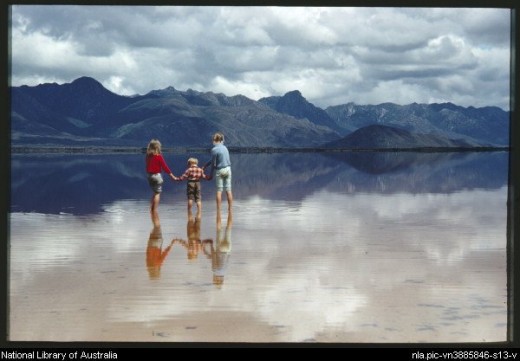 What we destroyed… Olegas Truchanas’ children playing in Lake Pedder in Tasmania’s Southwest in 1971. Less that 12 months later it was flooded. What we destroyed… Olegas Truchanas’ children playing in Lake Pedder in Tasmania’s Southwest in 1971. Less that 12 months later it was flooded.
In 1974 the head of the Lake Pedder Committee of Enquiry, Edward St John QC would famously claim “The day will come when our children will undo what we so foolishly have done.”
.
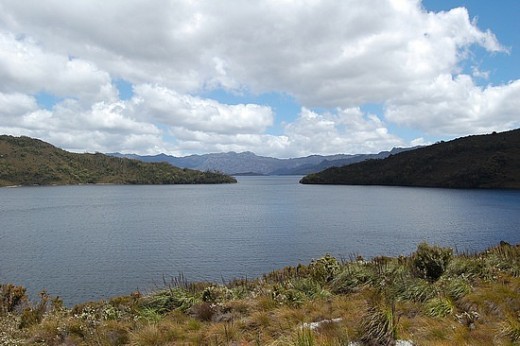 Fake Pedder ~ today’s drowned lake Fake Pedder ~ today’s drowned lake
.
.
About Olegas Truchanas

.
Olegas Truchanas, a Lithuanian born in 1923, emigrated to Tasmania after World War II, during which he fought with the Lithuanian resistance and spent time in displaced persons’ camps in Allied-occupied Germany.
From the 1950s, Olegas photographed Tasmania’s remote south-west wilderness, frequently travelling solo and risking his life in order to do so. He also met and married a Tasmanian, Melva, and together they built a house and had three children.
Through his photography, Olegas established a salon-style connection with a circle of Tasmanian photographers and watercolour painters known as the Sunday Group, and he worked with them to save a remote glacial lake with pale pink sands – Lake Pedder – from inundation by a hydroelectric scheme.
This was Australia’s “first globally noticed environmental battle, and later produced the world’s “first greens party. The campaign failed and the lake was lost. Soon afer, in early 1972, Olegas drowned while on a photographic expedition to one of Tasmania’s wildest rivers.
.
.
Remembering Lake Pedder
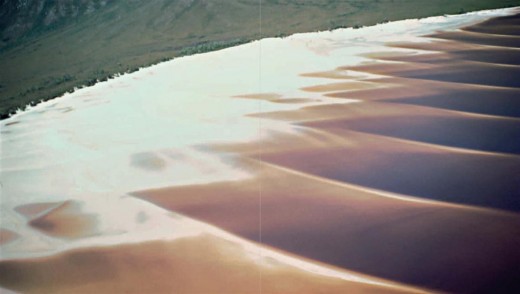
.
Play two rare videos of Lake Pedder by ABC Television just before the flooding:
Turn up your computer volume, then click one image at a time.
 . .

.
.
‘What Lake Pedder taught me’
by Brian Holden, 20081023, ^http://www.onlineopinion.com.au/view.asp?article=8057&page=2
.
‘It has gone, and after thousands of years of being, I was one of the last to absorb its magnificence. I still find it hard to believe that I was so fortunate. Lake Pedder February 1972 has become my dreamtime. It was for me a feeling of timelessness and a feeling of being in the type of place we were all meant to be.’
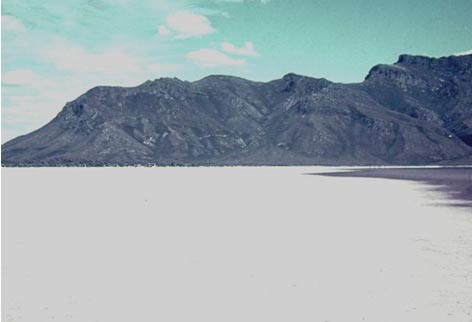 . .
What Lake Pedder taught me
‘Boneheaded politicians will only do what we let them get away with. One of our crown jewels was able to be destroyed for almost no gain because the public at large have become alien to the planet. It is normal to consume and pollute. It is normal to be stressed and in a spiritual void. We are lemmings racing towards the cliff edge – and there can be no turning back.’
.
.
‘Hydro Past Constrains Future’
by Peter Fagan, 20091027, Tasmanian Times newspaper, ^http://tasmaniantimes.com/index.php?/weblog/article/professor-west-reminds-tasmania-that-hydro-past-constrains-future/
.
‘Whatever else Tasmanians agree or disagree with in Professor West’s report, they should be grateful for this timely reminder that hydro-industrialisation continues to impose heavy costs on their state. In dollar terms alone, the sale of electricity to these industrial users below cost and way below potential value is costing the State Government up to $220 million in revenue every year.
If two-thirds of Tasmania’s annual electricity generation was to be freed up for purposes other than powering these old and highly energy-intensive plants, a range of options and opportunities would be available.
For example:
- A great deal more of the hydro electricity generated could be sold at peak times and peak tariffs via Basslink to mainland Australia
- Electricity production could be reduced whenever the hydro storage reservoirs were depleted by drought, restoring some degree of energy security to the system
- The ability of the hydro system to make electricity availabile instantly could enable integration of substantially more eco-friendly wind power into the Tasmanian and national grids – if this one isn’t clear to you the problem space is outlined in these Wikipedia articles:
http://en.wikipedia.org/wiki/Load_following_power_plant
http://en.wikipedia.org/wiki/Intermittent_power_source
.
The most intriguing possibility that gaining control of its electrical energy resource would afford Tasmania is the opportunity to revisit the restoration of Lake Pedder. Draining all or part of the Huon-Serpentine impoundment (the “new” Lake Pedder) need cost less than 20% of the electricity generation capacity of the Middle Gordon Scheme.
.
Restoration of the Lake would bring enormous benefits to Tasmania
.
Remember – less than 60 air miles from Hobart, one of the natural wonders of the world lies under less than 40 feet of water. It is submerged in a massive diversion pond (NOT a storage) whose sole purpose is to transfer water to a hydro power station, two thirds of whose output is gifted, below cost and way below potential value, to old-tech secondary industry.
Professor West’s recommendation serves to remind Tasmanians that what had become the political, social, economic and environmental nightmare of hydro-industrialisation did not end when the High Court ruled out the construction of the Gordon-below Franklin dam in July 1983. More than 25 years later, Tasmania – Australia’s poorest state – a rich island full of relatively poor people – continues to bleed revenue and incur household and business energy costs, social costs, environmental costs and opportunity costs resulting from the excesses of hydro-industrialisation.’
The case for restoration of Lake Pedder and a wealth of other resources are available from the Lake Pedder Restoration Committee web site: www.lakepedder.org
.
.
‘Lake Pedder: the beginning of a movement’
by Natasha Simons, Green Left, 19920930, ^http://www.greenleft.org.au/node/2943
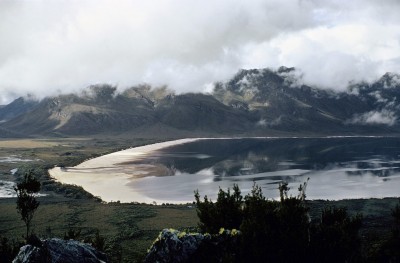
‘On September 8, 1972, Brenda Hean and Max Price, members of the Lake Pedder Action Group, waved goodbye to friends and relatives as their Tiger Moth plane taxied down the airstrip just outside Hobart. Their mission was to fly to Canberra and skywrite the message “Save Lake Pedder” to the federal government in an effort to stop the flooding of the lake. They have been missing ever since.
Twenty years ago the campaign to save Lake Pedder was lost, but its lessons were well learned by the new green movement. The fight to save Lake Pedder laid the foundations for the overwhelming success of the Franklin “no dams!” campaign in the early 1980s, and it inspired many environmental activists — some of whom, such as Bob Brown, hold seats in Parliament today.
Lake Pedder, in Tasmania’s wild south-west, is considered by many to be one of the most beautiful regions in the world. By 1946 Pedder had become a base for expeditions into all parts of the south-west. In 1955, 24 000 hectares were set aside as the Lake Pedder National Park. Bushwalkers, tourists and nature lovers came from afar to experience the beauty of Lake Pedder.
In 1967 the Hydro-Electric Commission proposed to build a power scheme in the Middle Gordon. This meant that Lake Pedder would be drowned by the damming of the Huon and Serpentine Rivers, which lay to the east and west of the lake.
In May 1967, the proposal was tabled in the state parliament. There was an immediate public outcry. Lake Pedder supporters began a petition to stop the proposal and collected 10,000 signatures, the largest number that had ever been collected in Tasmania. As the pressure mounted, the Labor government of “Electric Eric” Reece was forced to establish a select committee to determine the viability of the HEC proposal, and to look at alternatives.
However, the committee merely rubber-stamped the proposal. Two days later, on August 24, 1967, the enabling legislation was passed. Then the campaign to save Lake Pedder really began.
In 1969 the Reece government lost office in the wake of public discontent over the issue and the new government, a coalition of the Liberal and Centre parties headed by Angus Bethune, found itself in a difficult situation.
.
In March 1971 Brenda Hean and Louis Shoobridge, two prominent campaigners for Lake Pedder, organised a public meeting which packed the Hobart Town Hall.
Public opinion on the issue had polarised.
The public meeting proposed to call a referendum on the issue, but the “Shoobridge proposal”, as it became known, was defeated by a government wholeheartedly backing the HEC.
.
The grassroots activists refused to give up. They formed the Lake Pedder Action Group (LPAG), which took the issue to the federal government. As a result, Prime Minister William McMahon directed his unsympathetic environment minister, Peter Howsden, to raise an alternative scheme with Bethune. The Tasmanian premier responded with a resounding “No”.
Just as it seemed things were lost, the Bethune government was forced to the polls, and the environmentalists seized the opportunity. Again a public meeting was called in the Hobart Town Hall. Out of it the first green party, the United Tasmania Group (UTG), was formed. The UTG fielded candidates, among them Brenda Hean, with very diverse backgrounds but who were united in their desire to save Lake Pedder from the HEC.
The UTG polled well and, despite HEC attempts to discredit the campaign, Lake Pedder gained international attention, including support from organisations such as UNESCO. On July 24, 1972, 17,500 signatures reached the new premier, and the LPAG mounted a national campaign.
A few days before Brenda Hean and Max Price set off for Canberra, Hean had received an anonymous phone call from someone pressuring her to give up the campaign or “go for a swim”. The plane hangar was found to have been broken into and the safety beacon, normally stored on the plane, had been removed. There was never a proper inquiry into the case and no wreckage was ever found.
The Pedder campaigners now put their hopes on the newly elected federal Labor government, which mounted a federal-state inquiry. The Tasmanian government refused to participate, but the committee in June 1973 reported the area was too important to destroy. The inquiry recommended a moratorium on flooding so that the feasibility of saving the lake could be addressed. It adopted LPAG’s recommendations to pay the costs of the moratorium and any costs of modifying the scheme to save the lake. The weary LPAG activists could sense victory.
But the premier ignored the inquiry and gave the HEC the go-ahead. In March 1973 the vigil camp to save wildlife threatened by the rising waters was abandoned, and Lake Pedder was drowned. Tasmanian environmentalists had suffered their first great defeat.

In 1979, the HEC released details of another proposal, this time to flood the Franklin River, one of the last great wilderness areas in the world. This time it was met by a much tougher, more unified and stronger opposition.
The Franklin activists, headed by figures like Bob Brown, had learned how to run a campaign. They didn’t only argue that the Franklin should be saved, as the Pedder campaigners had done; they also presented a range of alternative and well thought-out proposals to the HEC. They gained national and international support for their campaign and employed direct action tactics as well. The Franklin was one of the biggest actions of civil disobedience the country had ever witnessed, with 1217 people arrested.
The Franklin blockade polarised the community on the West Coast. The issue tore the Tasmanian ALP apart, and it has never fully recovered from the blow.
The Franklin campaign was won, and in 1986 Bob Brown was elected to state parliament on a wave of green consciousness. Three years later, during which time the campaign for Wesley Vale was fought and won, he was joined by four other Green Independents.
“The failure of Lake Pedder was needed in a way”, says Green Independent Christine Milne, “to allow the fights for the Franklin and Wesley Vale to succeed. When the lake went under, there was a wide sense of guilt that made people feel they would never again allow that to happen without doing something.”
The momentum built up during the Lake Pedder and Franklin campaigns has been lost to the green movement in recent times. The electoral strategy of some sections has changed the focus from mobilising people to making changes through parliament. Lobbying the ALP has also proven largely ineffective for, while the federal Labor government has espoused green rhetoric, it has for the most part ignored environmental issues.
The recession has pushed the issue of living standards and jobs to the forefront. Big business, the government and the media all counterpose jobs to saving the environment, trying to drive a wedge between environmental and social justice issues.
The creation of jobs and defence of living standards need to be at the forefront of the green agenda, with the emphasis on environmentally sustainable jobs. By taking up more of the social justice agenda, the green movement may link up with others fighting for social change and revive the grassroots activity that can challenge the powers that be.’
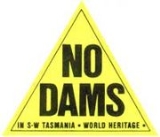
.
.
Further Reading:
.
[1] ‘Pedder Dreaming’ – media release [ Read More]
[2] ‘Pedder Dreaming’ book launches [ Read More]
[3] Lake Pedder Restoration Committee, ^http://www.lakepedder.org/index.html
[4] Lake Pedder – an overview of its history^ http://en.wikipedia.org/wiki/Lake_Pedder
[5] ‘ Remember Lake Pedder?‘, by Robert Rankin^ http://www.rankin.com.au/essay7.htm
[6] ‘ Lake Pedder‘, Timeframe,^ http://www.abc.net.au/science/kelvin/files/s18.htm
[7] Lake Pedder Earthworm, ^ http://www.environment.gov.au/cgi-bin/sprat/public/publicspecies.pl?taxon_id=83060
[8] Lake Pedder Report, presented by ABC Four Corners, 19710424, ^ http://www.abceducation.net.au/videolibrary/view/lake-pedder-report-126 [ View Video as mp4 – ensure volume is turned up first]
[9] Lake Pedder’s Future’ , by Peter Ross, ABC TV, This Day Tonight, 19720704, ^ http://abceducation.net.au/~abceduca/videolibrary/view/lake-pedders-future-74 [ View Video – ensure volume is turned up first]
[10] ‘ Whatever happened to Brenda Hean?‘ ^ http://www.abc.net.au/atthemovies/txt/s2367992.htm
[11] ‘ Whatever happened to Brenda Hean?‘, by Scott Millwood, ^ http://www.allenandunwin.com/default.aspx?page=94&book=9781741756111
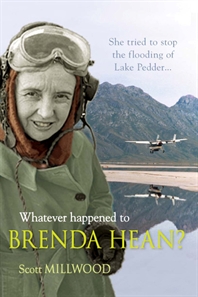
 Remembering Brenda Hean
In ‘Pedder’, Brenda had found her spiritual centre. Remembering Brenda Hean
In ‘Pedder’, Brenda had found her spiritual centre.
.
.
Tags: Brenda Hean, Eric Reece, fake pedder, green movement, HEC, Hydro-Electric Commission, Lake Pedder, Lake Pedder Action Group (LPAG), Lake Pedder Restoration Committee, Louis Shoobridge, Middle Gordon Scheme, Olegas Truchanas, Pedder Dreaming, Tasmania, the jewel of Tasmania's sacred primeval ecology, the victim of an ignorant time
Posted in 04. + Ecological Jurisprudence, 32 Ecosystem Rehabilitation!, Tasmania (AU), Threats from Hydro and Dams, Threats to Wild Tasmania | Comments Off on Lake Pedder – the victim of an ignorant time
Add this post to Del.icio.us - Digg
September 15th, 2011
The following article was published on CanDoBetter.net today (20110915) by wildlife ecologist and biologist, Hans Brunner, under the title: ‘A planned slaughter of endangered wildlife’
.
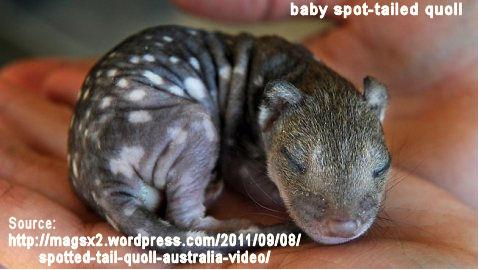
The Victorian Government plans to drop 1080 poison bait from an aircraft into forests could result in the extinction of the already critically endangered Spotted-tailed Quoll.
The purpose of this antiquated and vandalistic method is to poison wild dogs. Why is the Victorian Government using old, dangerous methods? This is like re-introducing the use of DDT. It is now a double disaster; all Ted Baillieu has to do now is to aerial bait to kill wild dogs in order to protect the cattle he allowed to go back into the mountains! Spot-tailed quolls and other dasyurids are meat eaters as well as some species of possums, reptiles, bandicoots and birds. They would be all at a serious risk of being poisoned. Further more, most of this bait would be wasted because of the dogs not being able to find them and this is where non-target animals will rather find and eat them. Baits have therefore to be placed only in places which dogs frequently use, along forest tracks.
.
More effective methods
There is a well researched and efficient method for the poisoning of wild dogs and foxes. It is a target specific bait station system which is successfully used throughout Victoria. Bait stations are placed along forest tracks where activities of dogs are observed.
A bait station consists of a mound of soil about 20 cm high and one meter in diameter. An un poisoned bait (free feed) is buried in the center of the mound about 10cm deep with some SFE lure placed on top. When the bait has been dug up and eaten, a check is made, with some experience, to assess whether a dog or fox took the bait. If satisfied that a target species took the bait it can be replaced with a poison bait. If it appears that a quoll or an other non-target animal may have taken the free feed bait, continue free feeding that station to keep the quoll and others away from a poison station (about 2 km away) or eliminate that station.
.
This is the only responsible way to poison dogs and foxes. Even better, it will be of great benefit to not only the quolls by removing the competition by dogs and foxes of their natural prey species, but also for the survival of Kangaroos, wallabies, bandicoots, possums, echidnas etc.
.
Biologist’s experience of alternatives
I have researched and tested this system in 700 square km of forest between Gembrook and Neerim and found it most effective and efficient. I have also introduced it in NSW National Parks where it was recognized as “The dog baiting stations proposed by Hans are the best practical suggestion to date. With the implementation of the bait stations, properly maintained and serviced at the appropriate times, there would appear to be NO reason to allow the continued use of aerial baiting” and, “Poisoning using the buried bait technique is still proving extremely target specific, with dogs and foxes being the only species killed”.
.
Do it the right way and wildlife return
Barbara Triggs, an eminent naturalist stated after poisoning wild dogs and foxes and using the bait station system on her property in Croajingolong National Park, East Gippsland:
.
“At no time has there been any evidence that a bait has been taken by a non-target animal. In the past year the numbers of native animals seen on the property have increased startlingly. The Red-necked Wallabies, who’s group was here in low numbers, have increased markedly from five individuals to now at least fourteen. The most surprising increase has been in the population of Long-nosed Bandicoots. The Dusky Antechinus, Swamp Rats, Water Rats, Sugar Gliders and several species of ground-nesting birds and also species of owls are much more in evidence than ever before.”
.
With all this evidence, this non specific and irresponsible aerial baiting must be immediately stopped.’
Hans Brunner
Wildlife biologist
Sept 2011
Leave a Reply
You must be logged in to post a comment.
|
|
 Katoomba Sports & Aquatic Centre
Blue Mountains, New South Wales, Australia
Katoomba Sports & Aquatic Centre
Blue Mountains, New South Wales, Australia
 The Outdoor Pool of the Aquatic Centre…drained every winter
(Photo by Editor 20110516, free in public domain)
The Outdoor Pool of the Aquatic Centre…drained every winter
(Photo by Editor 20110516, free in public domain)
 The Aquatic Centre was constructed conveniently adjacent to the Catalina Dam
The Aquatic Centre was constructed conveniently adjacent to the Catalina Dam
 Catalina Dam, which in the late 1940s was glorified as a ‘lake’ by developer Horace Gates
Catalina Dam, which in the late 1940s was glorified as a ‘lake’ by developer Horace Gates Upper Kedumba Creek downstream of Catalina Dam
Upper Kedumba Creek downstream of Catalina Dam
 Upper Kedumba Creek downstream of Catalina Dam – close up
Upper Kedumba Creek downstream of Catalina Dam – close up
 Katoomba Falls Creek naturally flows over Katoomba Falls
Katoomba Falls Creek naturally flows over Katoomba Falls
 Katoomba Falls flows down the Blue Mountains escarpment into the Kedumba River
Katoomba Falls flows down the Blue Mountains escarpment into the Kedumba River
 The Kedumba River flows through the Greater Blue Mountains World Heritage Area.
The Kedumba River flows through the Greater Blue Mountains World Heritage Area.

 Styx Big Trees decimated around the corner by Forestry Tasmania
Styx Big Trees decimated around the corner by Forestry Tasmania





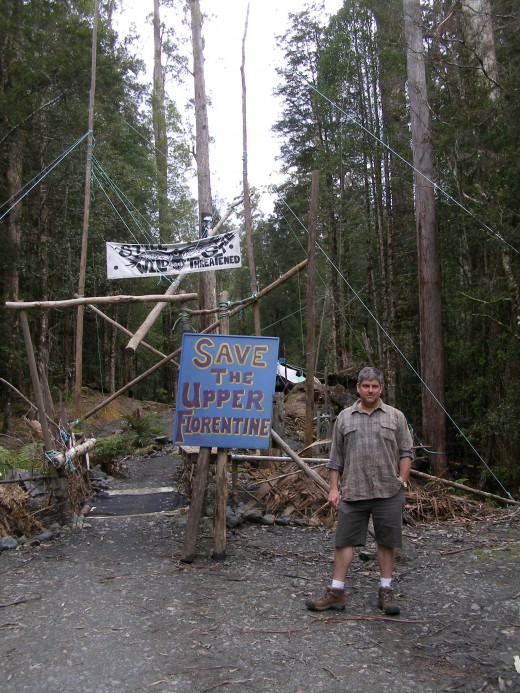
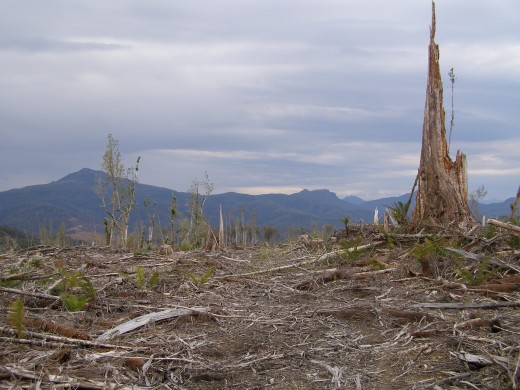
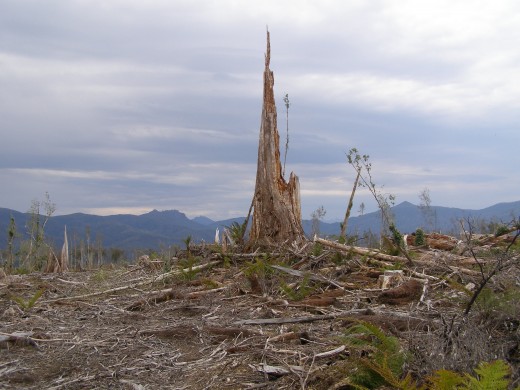
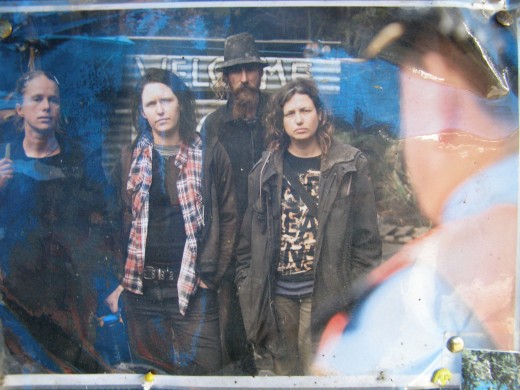
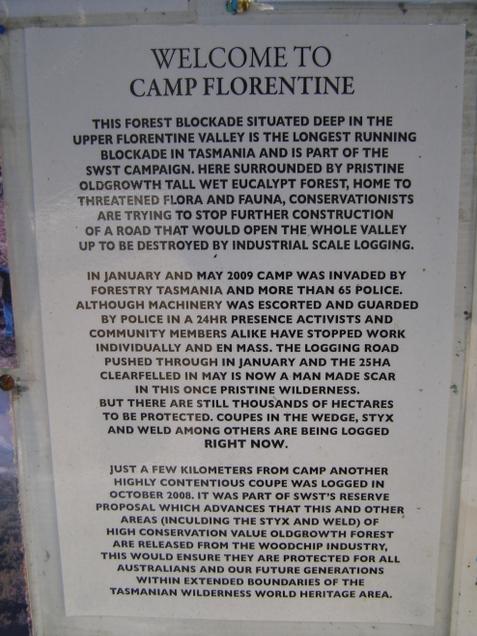

















 Get out of my bloody way!
It’s logging season and they could change the laws next week!
Get out of my bloody way!
It’s logging season and they could change the laws next week!










































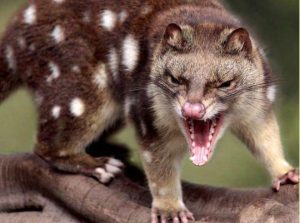

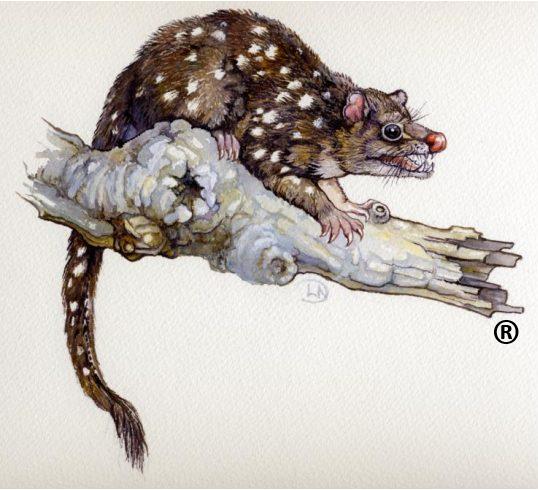
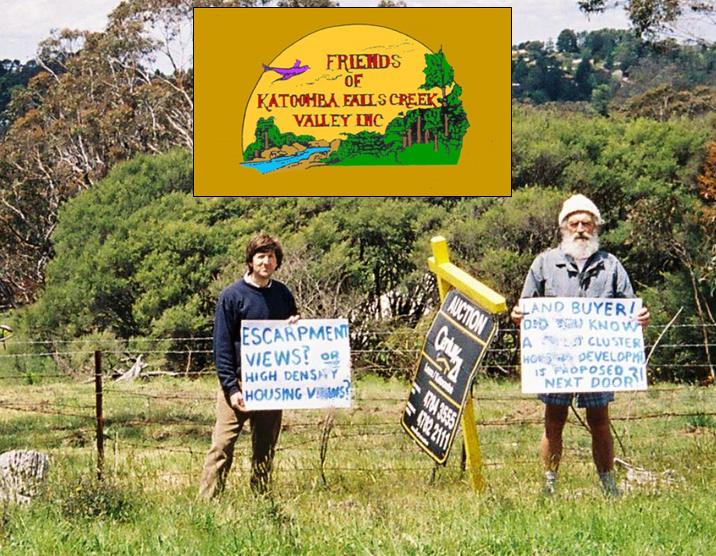
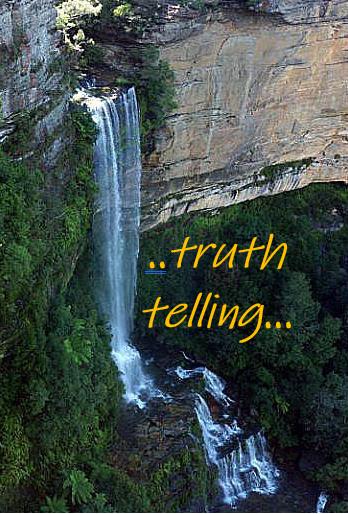
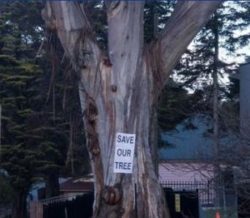
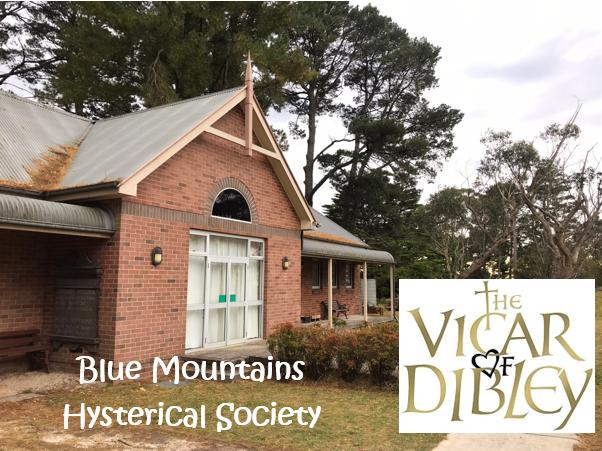

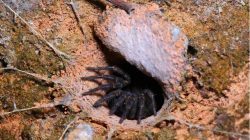

good on you for raising this as a major issue.Unfortunately this type of pollution can be seen all over the mountains. Runoff from Katoomba street including all refuse ends up down Leura Cascades which flows to Sydney’s water supply.
It again reaffirms the position that you cannot protect the World Heritage Areas without protecting the area above the escarpment. Its time there was a limit on development and a crackdown on littering etc.
cheers